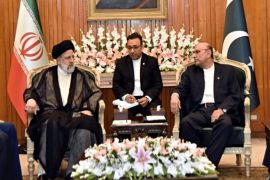The government of Pakistan on Monday signed an agreement with the Asian Development Bank (ADB) worth $1.3 billion for budgetary support and reforms.
Economic Affairs Division Secretary Syed Pervaiz Abbas and ADB Country Director Xiahong Yang signed the agreement during a ceremony where Minister for Economic Affairs Hammad Azhar was also present, according to a press release.
The approval for the loan had come through last week.
Under the agreement, ADB has committed to providing $1 billion towards the Economic Stabilisation Programme which aims to improve exchange rate management, strengthen public financial management, restore allocative efficiency of scarce public resources and reduce the social impacts of macroeconomic stability measures, said the press release.
Out of the total $1.3 billion loan, $300 million have been set aside for reforming the energy sector and the Financial Stability Programme. This aims to address energy shortfalls as well as policy related shortcomings in the country's energy sector.
On the occasion, Azhar stated, "The policy-based loan will not only strengthen exchange reserves but will also provide fiscal space to the government for implementing its reforms agenda".
"ADB is committed to widespread financing options to strengthen Pakistan's economy and reduce the risk of external economic shocks," said Yang.
She also reiterated the bank's strong commitment to further strengthen and expand its partnership with Pakistan.
In a report issued in Sept, the ADB reaffirmed that the country's economy is expected to grow slower than last year, with GDP growth projected at 2.8 per cent in the fiscal year 2020.
The report noted that economic growth in Pakistan had decelerated during the fiscal year 2019; this reflected "lower investment amid policy uncertainty and persistent macroeconomic imbalances".
The report highlighted that rising inflation was "mainly reflecting currency depreciation and a considerable increase in domestic fuel prices".







